China Insight
Gamifying Propaganda: Everything You Need to Know about China’s ‘Study Xi’ App
Scoring points by doing Xi-focused quizzes and watching ‘Xi Time’ news: this app takes propaganda to a whole other level.
Published
5 years agoon
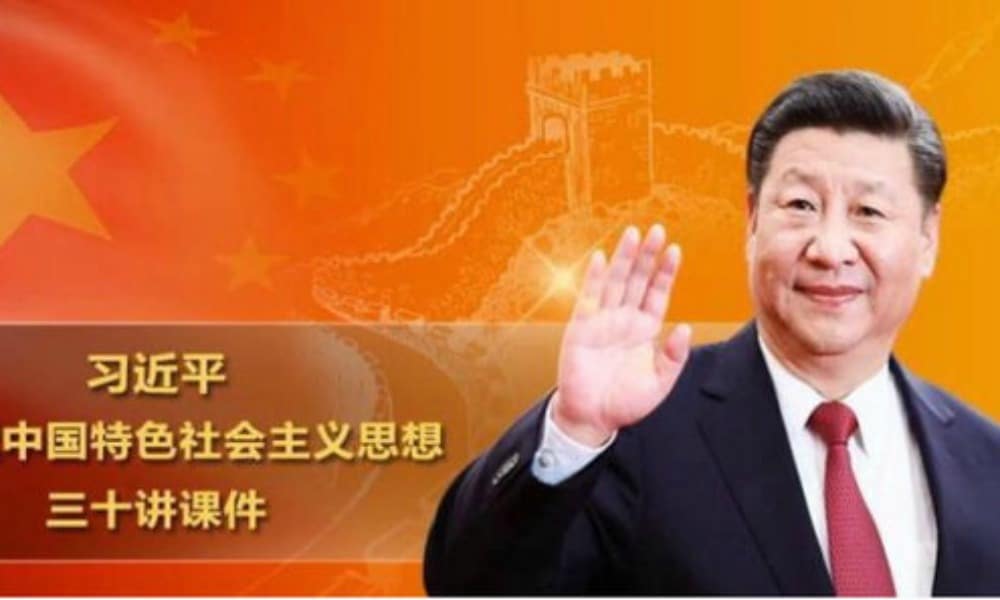
First published
A new app that encourages China’s online population to study Xi Jinping Thought has made headlines, both in and outside of China. Here’s everything you need to know about this new interactive propaganda tool. An overview by What’s on Weibo.
On January 1st, the Xué Xí Qiáng Guó app was launched on various Chinese app stores. The app is an initiative by the Propaganda Department of the Central Committee of the Communist Party, and is linked to the xuexi.cn platform, which was first set up in 2018.
The app has been making headlines in Chinese and English-language media this week. The BBC referred to the app as a “little red book,” and reported that members of the ruling Communist Party, as well as state-owned company employees who are not Party members, have allegedly been required to download and use it on a daily basis (Feb 15).
The Guardian reported that government officials in Fujian province and Qingdao city held workshops last month stressing the political importance of the app, and directing local leaders to promote the app across government departments (Feb 15).
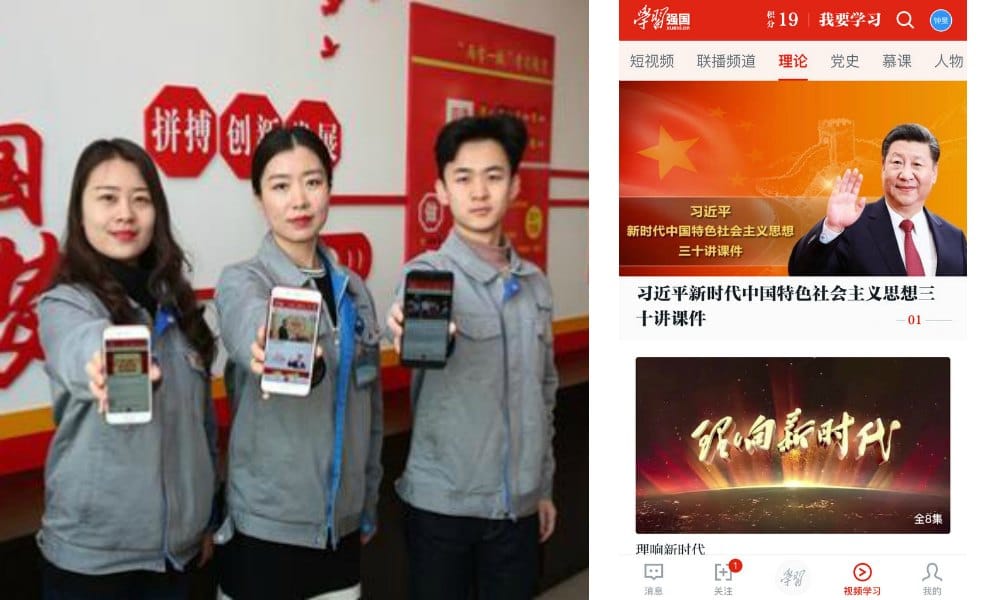
Although some reports claim that the app is making its way to top lists of most downloaded apps in China, it only scored a position 72 in the top 100 list of popular Chinese app store 360app at time of writing. The app store does state that the app has been downloaded 340000 times, with app users rating it with 2,5 stars out of 5. In the Tencent store, the app was downloaded 2,1 million times.
However, these numbers do not necessarily indicate much about the total number of downloads, since the app can be directly downloaded as an APK file from various locations. In the Chinese Apple store, the app is now the number one scoring app in the educational category. The app is only available in Chinese, and is not available from the Google Play store or Apple stores outside of China.
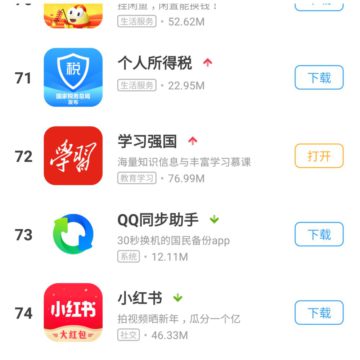
The app’s name (学习强国) is translated as the ‘Study Xi Strong Country’ app in various English-language media reports, but a more suitable translation would perhaps be ‘Study Xi, Strengthen China.’1 There’s a wordplay in the name, since the Mandarin word for ‘studying’ is ‘xuéxí’ which also incorporates the name of Xi, and in this context means both ‘Studying’ as well as ‘Study Xi.’
The main slogan of the ‘Study Xi’ app is one of Xi’s own sayings: “Dreams start with studying, careers start from doing” (“梦想从学习开始,事业从实践起步”, loose translation). Both the idea of ‘Dreams’ and of ‘Studying’ are concepts that are consistently promoted in the Xi era, with the idea that the common dream of the people is the ‘Chinese Dream’ of bringing about the “great rejuvenation of the Chinese nation.” Within this Chinese dream, studying is generally promoted as a “secret weapon” that will strengthen the Party and the nation (Xiao 2016).
A Multi-Functional Propaganda Tool
So what is the ‘Study Xi, Strengthen China’ app? It basically is a multi-functional educational platform that offers users various ways to study Xi Jinping Thought, Party history, Chinese culture, history, and much more. Once people are registered on the app, they can also access the platform via PC.
An important part of the app is its news feed: its home page features “recommended” reads that all focus on Xi Jinping and the Party. Another major feature is its ‘quiz’ page: every week, there are different quizzes that users can do, relating to all sorts of things, from Party ideology to famous Chinese poems.
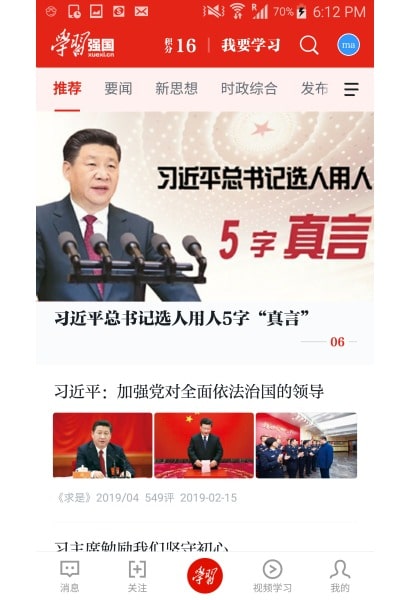
We’ve listed some of the app’s functions below. It is much more than a media app alone; it also has a social function, that allows users to connect with friends, message them, call them, and even send them ‘red envelopes’ (money presents).
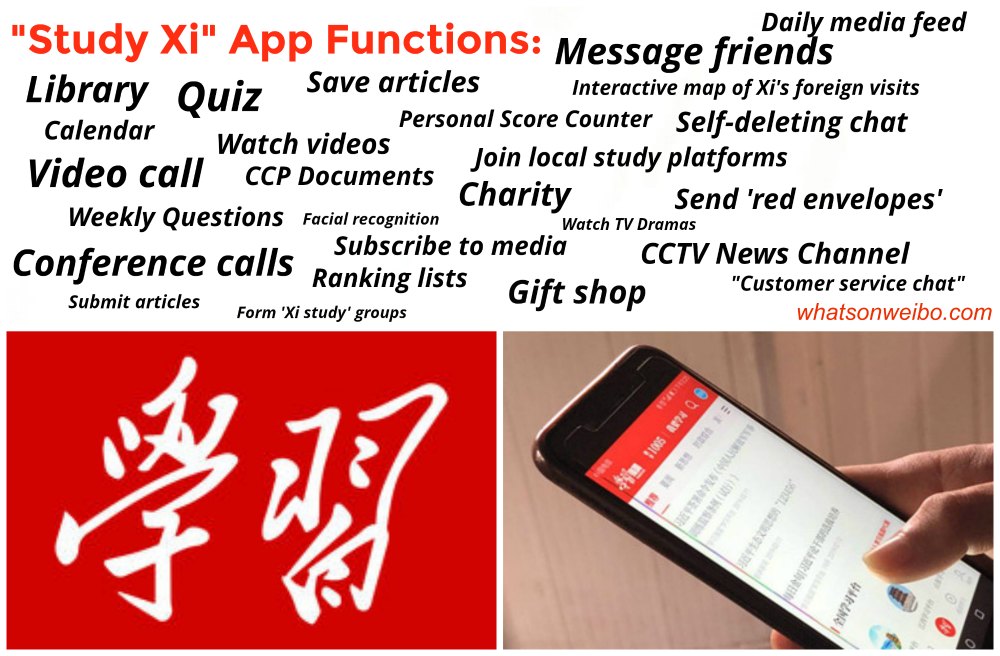
The ‘red envelope’ function is made possible through Alipay, the online payment platform that is owned by Ant Financial Services Group, an affiliate company of the Chinese Alibaba Group.
One way for users to verify their identity on the app is also by linking it to their Alipay account. Various media reports also claim that the app is linked to Alibaba’s Ding Ding platform, an enterprise chat app that has a multitude of functions, many of which are also incorparated in the ‘Study Xi’ app (for more about Ding Ding, see our article here).
Given the cooperation with Alibaba, it is perhaps not surprising that upon registering for the app with just my phone number, it already knew my nickname without me putting it in. The app also listed an old smartphone I used some two years ago as a “frequently used” device, although I had just downloaded the app the day before and had never registered for it before.
So I just registered for the first time for the new “Study Xi Strong Country” app, which requires a phone number. It then told me “hi manyapan,” and that this phonenumber was already registered for the app. I’ve never registered before and never put in my manyapan nickname. 🤔 pic.twitter.com/8WQWq3D46T
— Manya Koetse (@manyapan) 16 februari 2019
“Study Xi” app day two. Not only did the app know my nickname upon registering for 1st time, it also lists a HTC phone I used some two years ago under “frequently used devices.” Most likely imports data from Alipay app. pic.twitter.com/qQ9Sdgk3Fp
— Manya Koetse (@manyapan) 17 februari 2019
Twitter user @yanshitou12 also noted that, upon using a friend’s number to register for the app, her Ding Ding conversations were automatically loaded into the chat history, suggesting that Alibaba’s Ding Ding is indeed fully integrated with the app.
My phone cn number expired, so I used friend’s number. The app automatically loaded her conversation history from the app 针针, on my phone, without even asking
— 盐石头 (@yanshitou12) 16 februari 2019
Like Ding Ding, the ‘Study Xi’ app also allows users to set up conference calls, send ‘self-deleting’ chats (like Snapchat), and use the app’s calendar function. Its many practical functions make this an app that is especially convenient for China’s 89,5 million Party members to stay close to the Party and its activities.
How to Score with Xi
The app’s most noteworthy and perhaps also most appealing feature is its scoring system, since it turns studying Party ideology and Xi Jinping Thought into a game.
Those who accumulate enough points can get an item from the app’s ‘prize shop.’ There are also contests which users can join to compete over a Huawei tablet or other items.
One Weibo user shared that she had just received her Modern Chinese Dictionary by mail through the app’s ‘gift shop,’ another person expressed her surprise that a delivery man came to deliver her prize at her door. “Thank you, Propaganda Department!”, she wrote.
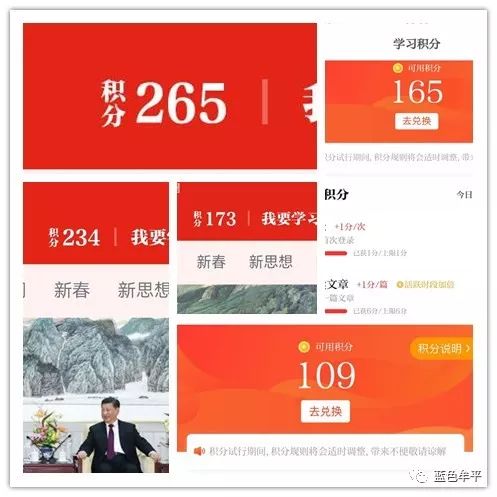
The score system works as follows:
- Upon registering for the app, you receive 1 point.
- For every article or essay one reads, you get 1 point (one per article, does not work with articles that have already been viewed before).
- For every video you watch you get 1 point (the same video won’t be credited with an extra point if you see it twice).
- The time you spend on the app is also rewarded with points: for every 4 minutes of reading, you get 1 point (max 8 points per day).
- For every 5 minutes of watching a video, you get 1 point (max 8 points per day).
- You get 1 point for “subscribing” to a media account, which will then show up in your news feed.
- If you share two articles with friends, you get 1 point.
- You get 1 point for every two articles or essays you ‘save’ within the app.
- If you score 100% on a quiz, you get 10 points.
What is quite remarkable about the app, is that it encourages users to ‘Study Xi’ at particular times of the day. The morning 6:00-8:30 timeframe, along with the 12:00-14:00 slot and evening 20:00-22:30 times, are designated as so-called “active time slots” during which users can score double points for their activities. Within these time slots, reading an article would, for example, grant a user 2 points instead of 1.
This signals that, in line with good working morale, people are supposed to look into the app during their morning commute, their lunch break, and before bedtime, and are indirectly discouraged from using it during (office) working hours.
The points that are scored on the app will be valid for two years.
On Weibo, some netizens are quite serious about the ‘gaming’ aspect of this app, and have already found ways to cheat the system. They share tips and tricks on how to score within the app: points are credited within 10 seconds of clicking an article, for example, and watching videos can be easily rewarded with a point if one immediately scrolls to the end.
Through the PC version of the app, it is easy to let certain videos play while scrolling the internet, basically earning points without actually watching the videos.
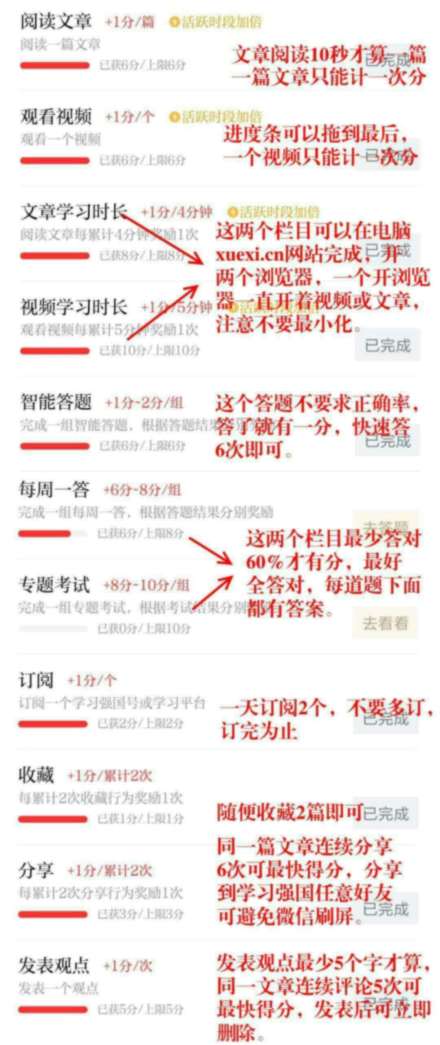
“Thanks,” many commenters reply to these cheating tricks: “Just what I was looking for.” “I already received 50 points in one day!”
A Library in Your Pocket: Media, Books, Movies
The ‘Study Xi’ app focuses on some dozen media outlets that users can subscribe to and which also show up in the ‘recommended’ homepage feed.
Incorporated in the app are state media outlets China Daily (中国日报网), People’s Daily (人民网), Xinhua (新华), Qiushi Journal (求是网), China Military Web (中国军网), Economic Daily (经济日报), and others.
The app also incorporates local ‘Study Xi’ platforms, from Hubei to Jiangxi, from Shandong to Fujian.

Besides these media, the app also has TV channels people can watch videos on, from CCTV News to a special ‘Xi Time’ news programme, to various TV dramas, including Turbulence of the Mu Clan (木府风云) and Romance of Our Parents (父母爱情).
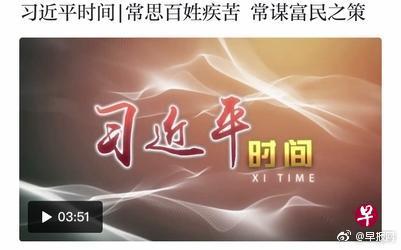
“Xi Time” news clips focus on the activities of Xi Jinping.
There is also a movie section within the app, where users can watch classics such as The Long March (长征), The Founding Ceremony of the Nation (开国大典), films on Deng Xiaoping or Zhou Enlai, and various movies that focus on the Second Sino-Japanese War.
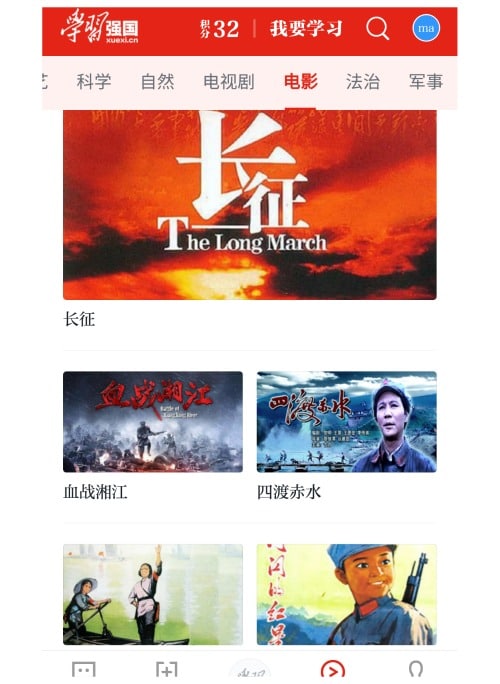
The ‘Study Xi’ library section grants users access to dozens of books. On the desktop version, the library is shown as an actual office, where you can click on the books that are displayed on the shelves and read them.

Some books are those by Xi Jinping, including The Governance of China (习近平谈治国理政), but there are also books by the famous Chinese author Lu Xun, or the 20th-century classic Rickshaw Boy by Lao She, and various works on calligraphy and poetry.
There is also an entire section of books available from a whole range of topics varying from astronomy to maths, biology, and geography. The books are available for online reading in pdf.
In general, you could say that the selection of media, videos, and books all fall into the categories of Chinese traditional culture and canonical literature, historical themes, science and technology, and the political themes of Party ideology and the Xi Jinping Thought that focuses on ‘socialism with Chinese characteristics’ (中国特色社会主义).
Those who read enough state media and Party articles will easily be able to do the quizzes and weekly questions in the app. Besides the standard ideological questions, it also draws from popular culture; I came across a question that used a trailer of China’s latest sci-fi movie The Wandering Earth that needed to be watched in order to complete the question.
Propaganda in the Xi Era
So how popular is the app, really? If the headlines in Chinese and non-Chinese media are to be believed, the majority of Chinese internet users are getting hooked on the app. That picture is perhaps the rose-colored one the Party would like to envision, but judging from social media comments and app ratings, reactions have been somewhat lukewarm.
On Weibo, there are some commenters who are sharing their 1000-point status on the app, or who say they enjoy looking into the app right before sleeping.
Dozens of commenters indicate that they have to assist their parents in using the app, or that it is not them, but their parents who are ‘hooked’ on the app – the majority of Weibo users are in the 20-35 years age group.
There are local trainings on making (older) Party members more familiar with the app, how to download it and how to use it. A local Chongqing community Weibo account recently posted the pictures below of their ‘Study Xi’ gathering.
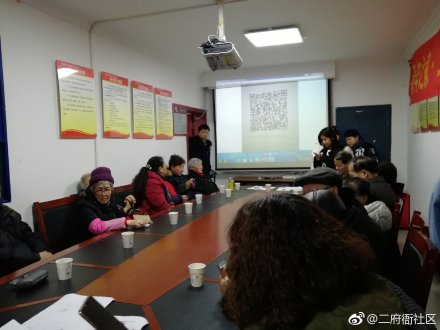

On social media, some commenters complain about the fact that the Chinese Apple store has turned off the review comment sections on the app, despite the fact that it allegedly scored a number one spot in its “educational app” section.
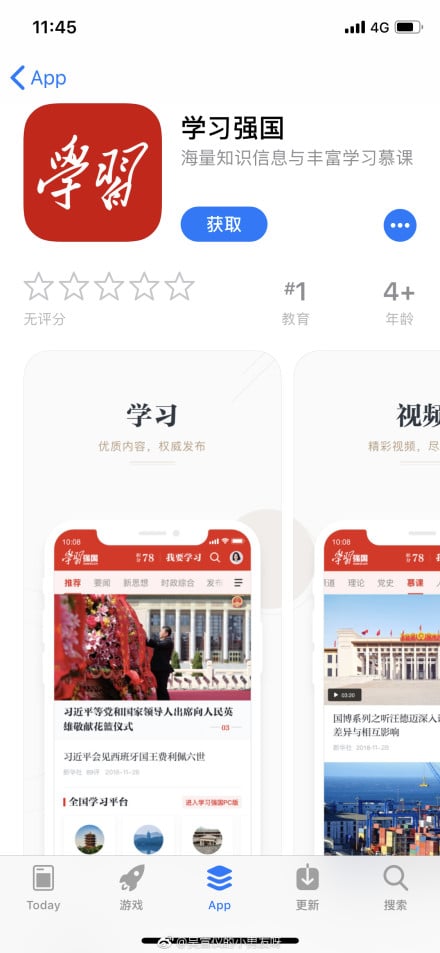
Then there are also dozens of commenters who say they often use the app: the score matters to them. In a time when everything is mobile, and online gaming is booming, it seems that ‘Study Xi, Strengthen China’ has made its app all the more relevant by adding the scoring element.
In doing so, the Propaganda Department of the Communist Party is continuing on the same route it has taken for the past couple of years, which shows a clear break with the propaganda machine before the Xi era.
Not only does the propaganda in the Xi era strengthen the idea of Xi as a political idol, it also fully embraces the Internet, the online media environment, and its related pop culture in doing so (also see Chang & Ren 2018).
Since 2017, various noteworthy propaganda moments, such as the 2017 Xi Clapping Game, the cartoonification of Xi, or the One Belt, One Road media publicity hype, all point in the same direction, namely that the Party propaganda will use the modes of communication and technology that are most popular among China’s (younger) online population to reach their audiences.
For now, I am still stuck below 50 points on the ‘Study Xi’ app. The scoring element is powerful: I feel triggered to get my score up. Maybe watch a few more videos, do better on the quiz, and read some more state media articles. I might just be tempted to go back for some more Xi-studies.
By Manya Koetse
Follow @whatsonweibo
1Translation suggested by Helen Wang @helanwanglondon.
References
Chang, J., & Ren, H. 2018. “The powerful image and the imagination of power: the ‘new visual turn’ of the CPC’s propaganda strategy since its 18th National Congress in 2012. Asian Journal of Communication, 28(1), 1–19.
Xiao Junhua 肖君华. 2016. “Dreams Start with Learning – Studying General Secretary Xi Jinping’s Important Discourse on Learning [梦想从学习开始——学习习近平总书记关于学习的重要论述]” Guangming Daily, via CPC News, 7 July http://theory.people.com.cn/n1/2016/0707/c376186-28531506.html [18.1.19].

Directly support Manya Koetse. By supporting this author you make future articles possible and help the maintenance and independence of this site. Donate directly through Paypal here. Also check out the What’s on Weibo donations page for donations through creditcard & WeChat and for more information.
Spotted a mistake or want to add something? Please let us know in comments below or email us.
©2019 Whatsonweibo. All rights reserved. Do not reproduce our content without permission – you can contact us at info@whatsonweibo.com.
Manya Koetse is the founder and editor-in-chief of whatsonweibo.com. She is a writer, public speaker, and researcher (Sinologist, MPhil) on social trends, digital developments, and new media in an ever-changing China, with a focus on Chinese society, pop culture, and gender issues. She shares her love for hotpot on hotpotambassador.com. Contact at manya@whatsonweibo.com, or follow on Twitter.

China Insight
The Tragic Story of “Fat Cat”: How a Chinese Gamer’s Suicide Went Viral
The story of ‘Fat Cat’ has become a hot topic in China, sparking widespread sympathy and discussions online.
Published
3 months agoon
May 9, 2024
The tragic story behind the recent suicide of a 21-year-old Chinese gamer nicknamed ‘Fat Cat’ has become a major topic of discussion on Chinese social media, touching upon broader societal issues from unfair gender dynamics to businesses taking advantage of grieving internet users.
The story of a 21-year-old Chinese gamer from Hunan who committed suicide has gone completely viral on Weibo and beyond this week, generating many discussions.
In late April of this year, the young man nicknamed ‘Fat Cat’ (胖猫 Pàng Māo, literally fat or chubby cat), tragically ended his life by jumping into the river near the Chongqing Yangtze River Bridge (重庆长江大桥) following a breakup with his girlfriend. By now, the incident has come to be known as the “Fat Cat Jumping Into the River Incident” (胖猫跳江事件).
News of his suicide soon made its rounds on the internet, and some bloggers started looking into what was behind the story. The man’s sister also spoke out through online channels, and numerous chat records between the young man and his girlfriend emerged online.
One aspect of his story that gained traction in early May is the revelation that the man had invested all his resources into the relationship. Allegedly, he made significant financial sacrifices, giving his girlfriend over 510,000 RMB (approximately 71,000 USD) throughout their relationship, in a time frame of two years.
When his girlfriend ended the relationship, despite all of his efforts, he was devastated and took his own life.
The story was picked up by various Chinese media outlets, and prominent social and political commentator Hu Xijin also wrote a post about Fat Cat, stating the sad story had made him tear up.
As the news spread, it sparked a multitude of hashtags on Weibo, with thousands of netizens pouring out their thoughts and emotions in response to the story.
Playing Games for Love
The main part of this story that is triggering online discussions is how ‘Fat Cat,’ a young man who possessed virtually nothing, managed to provide his girlfriend, who was six years older, with such a significant amount of money – and why he was willing to sacrifice so much in order to do so.
The young man reportedly was able to make money by playing video games, specifically by being a so-called ‘booster’ by playing with others and helping them get to a higher level in multiplayer online battle games.
According to his sister, he started working as a ‘professional’ video gamer as a means of generating money to satisfy his girlfriend, who allegedly always demanded more.
He registered a total of 36 accounts to receive orders to play online games, making 20 yuan per game (about $2.80). Because this consumed all of his time, he barely went out anymore and his social life was dead.
In order to save more money, he tried to keep his own expenses as low as possible, and would only get takeout food for himself for no more than 10 yuan ($1,4). His online avatar was an image of a cat saying “I don’t want to eat vegetables, I want to eat McDonald’s.”

The woman in question who he made so many sacrifices for is named Tan Zhu (谭竹), and she soon became the topic of public scrutiny. In one screenshot of a chat conversation between Tan and her boyfriend that leaked online, she claimed she needed money for various things. The two had agreed to get married later in this year.
Despite of this, she still broke up with him, driving him to jump off the bridge after transferring his remaining 66,000 RMB (9135 USD) to Tan Zhu.
As the story fermented online, Tan Zhu also shared her side of the story. She claimed that she had met ‘Fat Cat’ over two years ago through online gaming and had started a long distance relationship with him. They had actually only met up twice before he moved to Chongqing. She emphasized that financial gain was never a motivating factor in their relationship.
Tan additionally asserted that she had previously repaid 130,000 RMB (18,000 USD) to him and that they had reached a settlement agreement shortly before his tragic death.
Ordering Take-Out to Mourn Fat Cat
– “I hope you rest in peace.”
– “Little fat cat, I hope you’ll be less foolish in your next life.”
– “In your next life, love yourself first.”
These are just a few of the messages left by netizens on notes attached to takeout food deliveries near the Chongqing Yangtze River Bridge.

AI-generated image spread on Chinese social media in connection to the event.
As Fat Cat’s story stirred up significant online discussion, with many expressing sympathy for the young man who rarely indulged in spending on food and drinks, some internet users took the step of ordering McDonalds and other food delivery services to the bridge, where he tragically jumped from, in his honor.
This soon snowballed into more people ordering food and drinks to the bridge, resulting in a constant flow of delivery staff and a pile-up of take-out bags.

Delivery food on the bridge, photo via Weibo.
However, as the food delivery efforts picked up pace, it came to light that some of the deliveries ordered and paid for were either empty or contained something different; certain restaurants, aware of the collective effort to honor the young man, deliberately left the food boxes empty or substituted sodas or tea with tap water.

At least five restaurants were caught not delivering the actual orders. Chinese bubble tea shop ChaPanda was exposed for substituting water for milk tea in their cups. On May 3rd, ChaPanda responded that they had fired the responsible employee.
Another store, the Zhu Xiaoxiao Luosifen (朱小小螺蛳粉), responded on that they had temporarily closed the shop in question to deal with the issue. Chinese fast food chain NewYobo (牛约堡) also acknowledged that at least twenty orders they received were incomplete.
Fast food company Wallace (华莱士) responded to the controversy by stating they had dismissed the employees involved. Mixue Ice Cream & Tea (蜜雪冰城) issued an apology and temporarily closed one of their stores implicated in delivering empty orders.
In the midst of all the controversy, Fat Cat’s sister asked internet users to refrain from ordering take-out food as a means of mourning and honoring her brother.
Nevertheless, take-out food and flowers continued to accumulate near the bridge, prompting local authorities to think of ways of how to deal with this unique method of honoring the deceased gamer.
Gamer Boy Meets Girl
On Chinese social media, this story has also become a topic of debate in the context of gender dynamics and social inequality.
There are some male bloggers who are angry with Tan Zhu, suggesting her behaviour is an example of everything that’s supposedly “wrong” with Chinese women in this day and age.
Others place blame on Fat Cat for believing that he could buy love and maintain a relationship through financial means. This irked some feminist bloggers, who see it as a chauvinistic attitude towards women.
A main, recurring idea in these discussions is that young Chinese men such as Fat Cat, who are at the low end of the social ladder, are actually particularly vulnerable in a fiercely competitive society. Here, a gender imbalance and surplus of unmarried men make it easier for women to potentially exploit those desperate for companionship.
The story of Fat Cat brings back memories of ‘Mo Cha Official,’ a not-so-famous blogger who gained posthumous fame in 2021 when details of his unhappy life surfaced online.
Likewise, the tragic tale of WePhone founder Su Xiangmao (苏享茂) resurfaces. In 2017, the 37-year-old IT entrepreneur from Beijing took his own life, leaving behind a note alleging blackmail by his 29-year-old ex-wife, who demanded 10 million RMB (±1.5 million USD) (read story).
Another aspect of this viral story that is mentioned by netizens is how it gained so much attention during the Chinese May holidays, coinciding with the tragic news of the southern China highway collapse in Guangdong. That major incident resulted in the deaths of at least 48 people, and triggered questions over road safety and flawed construction designs. Some speculate that the prominence given to the Fat Cat story on trending topic lists may have been a deliberate attempt to divert attention away from this incident.
‘Fat Cat’ was cremated. His family stated their intention to take necessary legal steps to recover the money from his former girlfriend, but Tan Zhu reportedly already reached an agreement with the father and settled the case. Nevertheless, the case continues to generate discussions online, with some people wondering: “Is it over yet? Can we talk about something different now?”

Fat Cat images projected in Times Square
However, given that images of the ‘Fat Cat’ avatar have even appeared in Times Square in New York by now (Chinese internet users projected it on one of the big LED screens), it’s likely that this story will be remembered and talked about for some time to come.
UPDATE MAY 25
On May 20, local authorities issued a lengthy report to clarify the timeline of events and details surrounding the death of “Fat Cat,” which had attracted significant attention across China.
The report concluded that there was no fraud involved and that “Fat Cat” and his girlfriend were in a genuine relationship. Tan did not deceive “Fat Cat” for money; the transfers were voluntary. Furthermore, Tan returned most of the money to his parents.
The gamer’s sister is reportedly still being investigated for potentially infringing on Tan’s privacy by disclosing numerous private details to the public.
In the end, one thing is clear in this gamer’s tragic story, which is that there are no winners.
By Manya Koetse
– With contributions by Miranda Barnes and Ruixin Zhang
Independently reporting China trends for over a decade. Like what we do? Support us and get the story behind the hashtag by subscribing:
Spotted a mistake or want to add something? Please let us know in comments below or email us. First-time commenters, please be patient – we will have to manually approve your comment before it appears.
©2024 Whatsonweibo. All rights reserved. Do not reproduce our content without permission – you can contact us at info@whatsonweibo.com.
China Brands, Marketing & Consumers
A Brew of Controversy: Lu Xun and LELECHA’s ‘Smoky’ Oolong Tea
Chinese tea brand LELECHA faced backlash for using the iconic literary figure Lu Xun to promote their “Smoky Oolong” milk tea, sparking controversy over the exploitation of his legacy.
Published
3 months agoon
May 3, 2024
It seemed like such a good idea. For this year’s World Book Day, Chinese tea brand LELECHA (乐乐茶) put a spotlight on Lu Xun (鲁迅, 1881-1936), one of the most celebrated Chinese authors the 20th century and turned him into the the ‘brand ambassador’ of their special new “Smoky Oolong” (烟腔乌龙) milk tea.
LELECHA is a Chinese chain specializing in new-style tea beverages, including bubble tea and fruit tea. It debuted in Shanghai in 2016, and since then, it has expanded rapidly, opening dozens of new stores not only in Shanghai but also in other major cities across China.
Starting on April 23, not only did the LELECHA ‘Smoky Oolong” paper cups feature Lu Xun’s portrait, but also other promotional materials by LELECHA, such as menus and paper bags, accompanied by the slogan: “Old Smoky Oolong, New Youth” (“老烟腔,新青年”). The marketing campaign was a joint collaboration between LELECHA and publishing house Yilin Press.

Lu Xun featured on LELECHA products, image via Netease.
The slogan “Old Smoky Oolong, New Youth” is a play on the Chinese magazine ‘New Youth’ or ‘La Jeunesse’ (新青年), the influential literary magazine in which Lu’s famous short story, “Diary of a Madman,” was published in 1918.
The design of the tea featuring Lu Xun’s image, its colors, and painting style also pay homage to the era in which Lu Xun rose to prominence.
Lu Xun (pen name of Zhou Shuren) was a leading figure within China’s May Fourth Movement. The May Fourth Movement (1915-24) is also referred to as the Chinese Enlightenment or the Chinese Renaissance. It was the cultural revolution brought about by the political demonstrations on the fourth of May 1919 when citizens and students in Beijing paraded the streets to protest decisions made at the post-World War I Versailles Conference and called for the destruction of traditional culture[1].
In this historical context, Lu Xun emerged as a significant cultural figure, renowned for his critical and enlightened perspectives on Chinese society.
To this day, Lu Xun remains a highly respected figure. In the post-Mao era, some critics felt that Lu Xun was actually revered a bit too much, and called for efforts to ‘demystify’ him. In 1979, for example, writer Mao Dun called for a halt to the movement to turn Lu Xun into “a god-like figure”[2].
Perhaps LELECHA’s marketing team figured they could not go wrong by creating a milk tea product around China’s beloved Lu Xun. But for various reasons, the marketing campaign backfired, landing LELECHA in hot water. The topic went trending on Chinese social media, where many criticized the tea company.
Commodification of ‘Marxist’ Lu Xun
The first issue with LELECHA’s Lu Xun campaign is a legal one. It seems the tea chain used Lu Xun’s portrait without permission. Zhou Lingfei, Lu Xun’s great-grandson and president of the Lu Xun Cultural Foundation, quickly demanded an end to the unauthorized use of Lu Xun’s image on tea cups and other merchandise. He even hired a law firm to take legal action against the campaign.
Others noted that the image of Lu Xun that was used by LELECHA resembled a famous painting of Lu Xun by Yang Zhiguang (杨之光), potentially also infringing on Yang’s copyright.
But there are more reasons why people online are upset about the Lu Xun x LELECHA marketing campaign. One is how the use of the word “smoky” is seen as disrespectful towards Lu Xun. Lu Xun was known for his heavy smoking, which ultimately contributed to his early death.
It’s also ironic that Lu Xun, widely seen as a Marxist, is being used as a ‘brand ambassador’ for a commercial tea brand. This exploits Lu Xun’s image for profit, turning his legacy into a commodity with the ‘smoky oolong’ tea and related merchandise.
“Such blatant commercialization of Lu Xun, is there no bottom limit anymore?”, one Weibo user wrote. Another person commented: “If Lu Xun were still alive and knew he had become a tool for capitalists to make money, he’d probably scold you in an article. ”
On April 29, LELECHA finally issued an apology to Lu Xun’s relatives and the Lu Xun Cultural Foundation for neglecting the legal aspects of their marketing campaign. They claimed it was meant to promote reading among China’s youth. All Lu Xun materials have now been removed from LELECHA’s stores.

Statement by LELECHA.
On Chinese social media, where the hot tea became a hot potato, opinions on the issue are divided. While many netizens think it is unacceptable to infringe on Lu Xun’s portrait rights like that, there are others who appreciate the merchandise.
The LELECHA controversy is similar to another issue that went trending in late 2023, when the well-known Chinese tea chain HeyTea (喜茶) collaborated with the Jingdezhen Ceramics Museum to release a special ‘Buddha’s Happiness’ (佛喜) latte tea series adorned with Buddha images on the cups, along with other merchandise such as stickers and magnets. The series featured three customized “Buddha’s Happiness” cups modeled on the “Speechless Bodhisattva” (无语菩萨), which soon became popular among netizens.

The HeyTea Buddha latte series, including merchandise, was pulled from shelves just three days after its launch.
However, the ‘Buddha’s Happiness’ success came to an abrupt halt when the Ethnic and Religious Affairs Bureau of Shenzhen intervened, citing regulations that prohibit commercial promotion of religion. HeyTea wasted no time challenging the objections made by the Bureau and promptly removed the tea series and all related merchandise from its stores, just three days after its initial launch.
Following the Happy Buddha and Lu Xun milk tea controversies, Chinese tea brands are bound to be more careful in the future when it comes to their collaborative marketing campaigns and whether or not they’re crossing any boundaries.
Some people couldn’t care less if they don’t launch another campaign at all. One Weibo user wrote: “Every day there’s a new collaboration here, another one there, but I’d just prefer a simple cup of tea.”
By Manya Koetse
[1]Schoppa, Keith. 2000. The Columbia Guide to Modern Chinese History. New York: Columbia UP, 159.
[2]Zhong, Xueping. 2010. “Who Is Afraid Of Lu Xun? The Politics Of ‘Debates About Lu Xun’ (鲁迅论争lu Xun Lun Zheng) And The Question Of His Legacy In Post-Revolution China.” In Culture and Social Transformations in Reform Era China, 257–284, 262.
Independently reporting China trends for over a decade. Like what we do? Support us and get the story behind the hashtag by subscribing:
Spotted a mistake or want to add something? Please let us know in comments below or email us. First-time commenters, please be patient – we will have to manually approve your comment before it appears.
©2024 Whatsonweibo. All rights reserved. Do not reproduce our content without permission – you can contact us at info@whatsonweibo.com.
Subscribe

Weibo Watch: The Future is Here

“Bye Bye Biden”: Biden’s Many Nicknames in Chinese

Enjoying the ‘Sea’ in Beijing’s Ditan Park

A Triumph for “Comrade Trump”: Chinese Social Media Reactions to Trump Rally Shooting

Weibo Watch: Get Up, Stand Up

The Tragic Story of “Fat Cat”: How a Chinese Gamer’s Suicide Went Viral

“Old Bull Eating Young Grass”: 86-Year-Old Chinese Painter Fan Zeng Marries 36-Year-Old Xu Meng

A Brew of Controversy: Lu Xun and LELECHA’s ‘Smoky’ Oolong Tea

Singing Competition or Patriotic Fight? Hunan TV’s ‘Singer 2024’ Stirs Nationalistic Sentiments

Zara Dress Goes Viral in China for Resemblance to Haidilao Apron

Weibo Watch: The Battle for the Bottom Bed

About the “AI Chatbot Based on Xi Jinping” Story

China’s Intensified Social Media Propaganda: “Taiwan Must Return to Motherland”

Weibo Watch: Telling China’s Stories Wrong

Saying Goodbye to “Uncle Wang”: Wang Wenbin Becomes Chinese Ambassador to Cambodia
Get in touch
Would you like to become a contributor, or do you have any tips or suggestions? Get in touch here!
Popular Reads
-

 China Insight3 months ago
China Insight3 months agoThe Tragic Story of “Fat Cat”: How a Chinese Gamer’s Suicide Went Viral
-

 China Music4 months ago
China Music4 months agoThe Chinese Viral TikTok Song Explained (No, It’s Not About Samsung)
-

 China Digital10 months ago
China Digital10 months agoToo Sexy for Weibo? Online Discussions on the Concept of ‘Cābiān’
-

 China Arts & Entertainment12 months ago
China Arts & Entertainment12 months agoBehind 8 Billion Streams: Who is Dao Lang Cursing in the Chinese Hit Song ‘Luocha Kingdom’?





